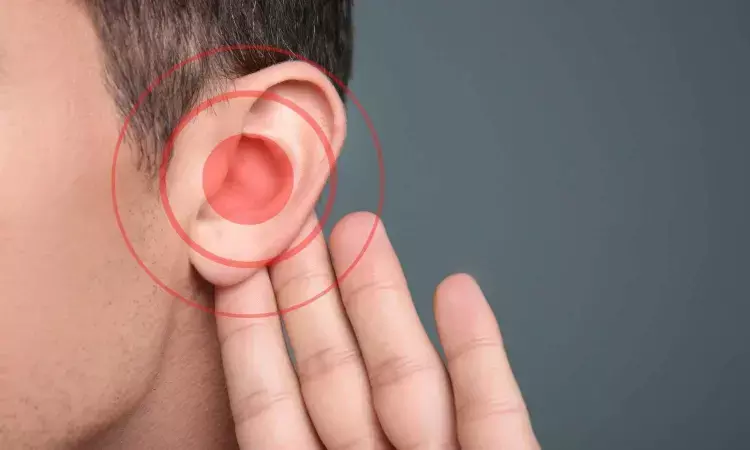- Home
- Medical news & Guidelines
- Anesthesiology
- Cardiology and CTVS
- Critical Care
- Dentistry
- Dermatology
- Diabetes and Endocrinology
- ENT
- Gastroenterology
- Medicine
- Nephrology
- Neurology
- Obstretics-Gynaecology
- Oncology
- Ophthalmology
- Orthopaedics
- Pediatrics-Neonatology
- Psychiatry
- Pulmonology
- Radiology
- Surgery
- Urology
- Laboratory Medicine
- Diet
- Nursing
- Paramedical
- Physiotherapy
- Health news
- Fact Check
- Bone Health Fact Check
- Brain Health Fact Check
- Cancer Related Fact Check
- Child Care Fact Check
- Dental and oral health fact check
- Diabetes and metabolic health fact check
- Diet and Nutrition Fact Check
- Eye and ENT Care Fact Check
- Fitness fact check
- Gut health fact check
- Heart health fact check
- Kidney health fact check
- Medical education fact check
- Men's health fact check
- Respiratory fact check
- Skin and hair care fact check
- Vaccine and Immunization fact check
- Women's health fact check
- AYUSH
- State News
- Andaman and Nicobar Islands
- Andhra Pradesh
- Arunachal Pradesh
- Assam
- Bihar
- Chandigarh
- Chattisgarh
- Dadra and Nagar Haveli
- Daman and Diu
- Delhi
- Goa
- Gujarat
- Haryana
- Himachal Pradesh
- Jammu & Kashmir
- Jharkhand
- Karnataka
- Kerala
- Ladakh
- Lakshadweep
- Madhya Pradesh
- Maharashtra
- Manipur
- Meghalaya
- Mizoram
- Nagaland
- Odisha
- Puducherry
- Punjab
- Rajasthan
- Sikkim
- Tamil Nadu
- Telangana
- Tripura
- Uttar Pradesh
- Uttrakhand
- West Bengal
- Medical Education
- Industry
Profound Hearing Loss Linked to Developmental Delays and vestibular impairment in children: Study

GMCH Offers Free Hearing Implants for Children
Researchers have found that children with profound hearing loss (HL) and vestibular impairment experience delayed posturomotor development and worse cochlear implant outcomes. This study, conducted at a pediatric referral center in Paris, underscores the importance of vestibular function assessment in children with profound HL to improve cochlear implant strategies and developmental support. This study was published in JAMA Network Open by Wiener-Vacher and colleagues.
Previous studies have shown that children with both profound HL and vestibular impairment fare worse with cochlear implants compared to those with normal vestibular function. However, vestibular function assessments are not typically integrated into the decision-making process for cochlear implantation. This study aimed to explore the prevalence of vestibular impairment according to HL origin and its impact on developmental milestones.
The main objectives of this study were to determine the prevalence of vestibular impairment based on the origin of HL and to assess the association between vestibular impairment and delayed posturomotor development in children with profound HL. This cohort study included children with profound HL (loss >90 dB HL) who underwent vestibular assessment before cochlear implantation between January 1, 2009, and December 31, 2019
The study utilized medical records data on HL origin, vestibular assessment, and developmental milestones. Children were categorized into three groups based on their vestibular function: normal vestibular function (NVF), partially impaired vestibular function (PVF), and complete bilateral vestibular loss (CBVL). The analysis included generalized logit models to evaluate the associations between vestibular impairment, HL origin, and developmental delays.
• The study included 592 children (308 males; mean age, 38 months). In those with a documented HL origin (n=266), 45.1% had HL of genetic origin, with half being syndromic (e.g., Usher and Waardenburg syndromes) and half nonsyndromic (e.g., connexin 26).
• Among the 74 children with infectious HL, 70.3% had cytomegalovirus (CMV) infection.
• Vestibular impairment was observed in 44.4% of the children, with most cases being symmetrical (88.9%).
• CBVL was present in 5.7% of the cases. Children with genetic syndromic HL showed a higher prevalence of vestibular impairment (78.3%), with 56.7% exhibiting PVF and 21.7% CBVL.
• Similarly, 69.2% of children with CMV infection had vestibular impairment, with 57.7% showing PVF and 11.5% CBVL.
• The odds of delays in developmental milestones (head holding, sitting, standing with support, and independent walking) were higher in children with PVF and CBVL compared to those with NVF.
• For example, the odds ratios for head-holding delays were 2.55 for PVF and 4.79 for CBVL.
• The ages at which these milestones were achieved were significantly higher in the CBVL group compared to the PVF group (e.g., head holding at 7.33 years for CBVL vs. 4.03 years for PVF; P<.001).
This study highlights the significant prevalence of vestibular impairment among children with profound HL, particularly those with genetic syndromic HL and CMV infection. The strong association between vestibular impairment and delayed posturomotor development underscores the need for comprehensive vestibular assessments before cochlear implantation.
Children with profound HL and vestibular impairment exhibit significant delays in posturomotor development. Given these findings, incorporating vestibular function assessments into the pre-implantation evaluation process can support early and tailored interventions, such as physical therapy for CBVL, enhancing overall outcomes for these children.
Reference:
Wiener-Vacher, S. R., Campi, M., Caldani, S., & Thai-Van, H. (2024). Vestibular impairment and postural development in children with bilateral profound hearing loss. JAMA Network Open, 7(5), e2412846. https://doi.org/10.1001/jamanetworkopen.2024.12846
Dr Riya Dave has completed dentistry from Gujarat University in 2022. She is a dentist and accomplished medical and scientific writer known for her commitment to bridging the gap between clinical expertise and accessible healthcare information. She has been actively involved in writing blogs related to health and wellness.
Dr Kamal Kant Kohli-MBBS, DTCD- a chest specialist with more than 30 years of practice and a flair for writing clinical articles, Dr Kamal Kant Kohli joined Medical Dialogues as a Chief Editor of Medical News. Besides writing articles, as an editor, he proofreads and verifies all the medical content published on Medical Dialogues including those coming from journals, studies,medical conferences,guidelines etc. Email: drkohli@medicaldialogues.in. Contact no. 011-43720751


